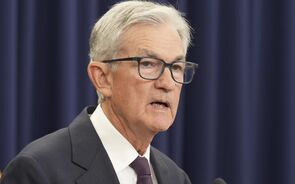Business this week
1 Mensagem
|Página 1 de 1
Business this week

Business this week
Apr 1st 2004
From The Economist print edition
Oil production cut
OPEC, the oil cartel, said it would cut production by 1m barrels a day, or 4%, in April. The move comes amid strong demand for crude oil.
British Petroleum shareholders are cheering high oil prices after the company announced it would give up to $33 billion back to shareholders over the next three years. This was prompted by its expectation that oil prices will continue to top $20 a barrel, and by strong growth in production.
Perhaps a new oil-exploration contract in Libya will help Royal Dutch/Shell, the troubled oil giant, pay its legal bills. The deal with a Libyan state-owned oil company could be worth as much as $1 billion. It will be a boost for Shell, whose share price has been pummelled in recent months after it restated its reserves. Shell faces investigations by federal regulators in America and class-action lawsuits from shareholders.
Pining for gold
Norilsk Nickel, Russia's biggest metals producer, paid $1.16 billion for a 20% stake in Gold Fields, a South African gold company. The deal was one of the largest ventures abroad by a Russian company.
Some 127 years after its founding, the London Metal Exchange is branching into new substances. It announced plans to start futures trading in plastics, the first such contracts in the world, by the end of this year.
Bosses' blues
Ulrich Schumacher, the outspoken boss of Infineon Technologies, a German microchip-maker, will rile colleagues and employees no more. Mr Schumacher was ousted amid discontent with his leadership style, and with his plans to move some business abroad.
Josef Ackermann, chief executive of Deutsche Bank, and five other defendants facing criminal charges in a high-profile trial in Germany seem likely to be acquitted after the presiding judge said that no criminal law had been broken. The charges had arisen as a result of Vodafone's takeover of Mannesmann in 2000.
Lawyers for Martha Stewart, the homemaking guru who was convicted of obstruction of justice last month, requested a new trial. They claimed that the failure of one of the jurors to disclose his criminal record stood in the way of a fair trial.
Shakour Shaalan, the Egyptian director of the IMF, proposed three candidates to be the organisation's next managing director—Stanley Fischer of Citigroup, Andrew Crockett of J.P. Morgan Chase and Mohamed El-Erian of PIMCO, a fund manager. Appointing Mr El-Erian or Mr Fischer, both of them Americans, would go against a longstanding tradition of awarding the post to a European.
Called to account
The International Accounting Standards Board released a set of accounting standards that will be used by dozens of countries and, from January 2005, all public companies in the European Union. A long-running dispute between the rule-making body and the European Union over how to account for derivatives and other financial instruments is still unresolved.
America's Financial Accounting Standards Board (FASB) proposed requiring all public companies to deduct the cost of stock options from profits. Technology companies and other big users of stock options complained that doing so would make it hard for start-ups to attract talented workers and so stifle innovation. They will probably try to repeat their quashing of a similar idea that was proposed by the FASB in the early 1990s.
Standard Life, Europe's biggest mutual life-insurer, said that it wanted to demutualise. Until it found itself short of capital at the start of this year, it had stoutly resisted the idea.
Britain's homeowners are still enjoying boom times. The Bank of England reported that mortgage lending grew 14.5% annually, the fastest rate in a decade. Nationwide, Britain's biggest building society, forecast a 15% rise in house prices this year.
The financial regulator of Fannie Mae and Freddie Mac announced that the two American mortgage-finance behemoths were adequately capitalised at the end of 2003 and could withstand a prolonged housing-market slump. Congress has been calling for tougher oversight of the two institutions since an accounting scandal erupted at Freddie Mac last year.
A yen to rise
Despite diligent dollar buying by the Japanese government, the yen surged to a four-year high, at ¥103.4 to the dollar, or about a cent each. Japanese businessmen, however, are apparently feeling more confident: the quarterly Tankan survey of business sentiment rose to its highest level in seven years.
Fonte:The Economist
Um abraço,
MozHawk
1 Mensagem
|Página 1 de 1
Quem está ligado:
Utilizadores a ver este Fórum: Google [Bot], Pmart 1 e 134 visitantes


